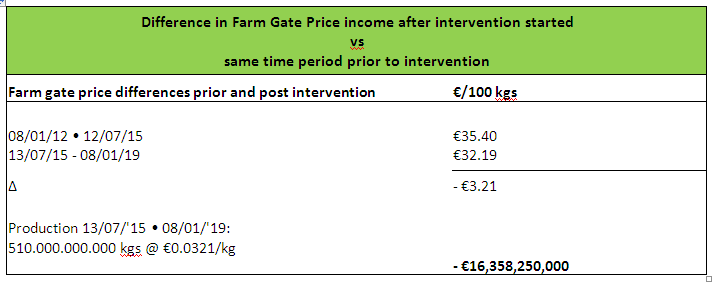 EU Intervention, 22 Jan, 2019 tender saw 18,514 mt sold at a minimum price of € 1,585. -/mt, leaving only 3,651.-/mt for the next tender #32 on 5th February.
EU Intervention, 22 Jan, 2019 tender saw 18,514 mt sold at a minimum price of € 1,585. -/mt, leaving only 3,651.-/mt for the next tender #32 on 5th February.
It has, after all, been a relatively swift exercise to sell the product back to the market.
Last week when asked for comment, EU’s Agri Commissioner Hogan made the following statements:
- (Intervention)’ helped to remove surpluses in a very imbalanced market scenario, playing a decisive role in stabilizing prices between 2015 and 2017/
- The Commission opened at the end of 2016 a process of monthly and later bi-monthly public tenders to gradually and cautiously put these stocks back into the market to avoid any kind of disruption or negative effect on producers.
- …/the latest tender is a clear vindication of the Commission’s prudential approach to the management of the stock of skimmed milk powder.
- ‘My objective, at all times, has been to use public intervention as a measure to protect farmers’ incomes and, to that extent, we resisted calls over the last three years to reduce stocks through a number of ways or even by simply destroying the stocks.’
- ‘None of these options would have achieved the outcome we have now achieved. Instead, our patient approach ensured that not only v/ere European dairy farmers’ incomes protected, but so too were the interests of the European taxpayer.’
Congratulations where they are due of course but we fail to see the merits in most of Commissioner Hogan’s statements.
- Intervention helped to remove surpluses but to what end? It certainly did not stabilise prices as Comm. Hogan claims. In the three and a half years since Intervention started, prices have been much lower than in the same time period before intervention:
To processors, the result of over production which has led to Public Intervention has been a decline in revenue of € 12.3 billion during the Intervention period. We see no proof whatsoever of prices having stabilized in that respect. One thing that did help keeping overall returns from falling further than they did was the unprecedented increase in Butter values which however, cannot be attributed to Intervention.
On a farm level, the consequences were even more severe and all but stabilized:
To dairy farmers the price for milk post intervention declined by 9% amounting to a total of € 16.3 billion in that period.
None of the proposed solutions would have achieved the current outcome, Comm. Hogan said.
We beg to differ:
Some solutions were unworkable due to legislation or were counterproductive. For instance, several proposals implied selling the product to the feed industry but that would have led to a declined consumption of ‘fresh’ product. Changed legislation of the Most Deprived People program made it impossible to sell to organisations operating under that, at prices below the historical buying price. As prevailing market prices most of the time have been below the historical Intervention price, this ensured no product was used for that purpose.
Commissioner Hogan continues to state that they resisted calls to reduce stocks through a number of ways, even by simply destroying stocks. We are well aware of the latter proposal as it’s the one that Greenmark proposed.
Although we fully agree that the idea was fairly ‘leftfield’ and disruptive, we maintain that everything would have turned out better than is the case today.
The Commission’s Intervention, which was a direct response to over production, has cost Processors € 12.3 billion, Farmer’s € 16.3 billion and the EU tax payer € 225 million.
“our patient approach ensured that not only were European dairy farmers’ incomes protected, but so too were the interests of the European taxpayer.” Well, demonstrably not.
About the rejected proposal to ‘destroy’ the material (in fact ‘use it for Bio mass’, which is something different):
- The plan to use the SMP for Bio mass would have returned a (small) amount by selling it to producers of Bio fuel.
- The shortfall to the EU would be compensated by charging the Dairy industry a penalty of € 0.05/kg per kg SMP produced. Within 9 months the full EU expenditure on the Intervention operation would have been recouped.
- Processors, although having to pay a penalty would recoup this by the 99% certainty of a scenario that market prices would recover quickly by much more than the said € 0.05/kg.
- As a result of the latter farmers would not have had to face the 9% decline in Farm Gate Prices.
- However leftfield the plan may have been, it would have resulted in a zero cost scenario for all involved in the Dairy chain and even the Tax payer.
- Even today’s prices with practically all stocks sold are a far echo from the prices prior to Intervention.
Alas, things went as they went due to a refusal to leave the trodden paths.
It is good to note however that yes, the stocks have been sold but they have for the bigger part remained in the system and were merely transferred from EU to Private stock. It will take considerable time before this volume is actually consumed.





